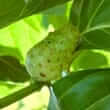Background
- Noni (Morinda citrifolia) is a traditional folk medicinal plant that has been used for over 2,000 years in Polynesia. Traditionally, Polynesians had many medicinal uses for noni including for fevers, headaches, malaria, bone fractures, dislocations, gastrointestinal disorders, urinary ailments, worms, wounds, rheumatism, and hypertension (high blood pressure). All parts of the noni plant were utilized.
- Although noni is a popular supplement, few clinical trials have been conducted on its uses. There is preliminary research supporting noni's popular use as an antioxidant, but more research is needed in this area to establish noni's effects.
- Based on scientific analysis and review of Tahitian Noni® juice, the European Commission Health and Consumer Protection Directorate-General Scientific Committee on Food found that "although some nutritional benefits are claimed for Morinda citrifolia L. products, the data supplied and the information available to the Committee provided no evidence for special nutritional benefits of Tahitian Noni® juice which go beyond those of other fruit juices."
References
- Arpornsuwan T, Punjanon T. Tumor cell-selective antiproliferative effect of the extract from Morinda citrifolia fruits. Phytother Res 2006;20(6):515-517.
View Abstract - Burrowes JD, Van Houten G. Use of alternative medicine by patients with stage 5 chronic kidney disease. Adv Chronic Kidney Dis 2005;12(3):312-325.
View Abstract - Carr ME, Klotz J, Bergeron M. Coumadin resistance and the vitamin supplement "Noni". Am J Hematol 2004;77(1):103.
View Abstract - Hornick CA, Myers A, Sadowska-Krowicka H, et al. Inhibition of angiogenic initiation and disruption of newly established human vascular networks by juice from Morinda citrifolia (noni). Angiogenesis 2003;6(2):143-149.
View Abstract - Jensen CJ, Westendorf J, Wang MY, et al Noni juice protects the liver. Eur J Gastroenterol Hepatol 2006;18(5):575-577.
View Abstract - Kamiya K, Tanaka Y, Endang H, et al. Chemical constituents of Morinda citrifolia fruits inhibit copper-induced low-density lipoprotein oxidation. J Agric Food Chem 9-22-2004;52(19):5843-5848.
View Abstract - Kamiya K, Tanaka Y, Endang H, et al. New anthraquinone and iridoid from the fruits of Morinda citrifolia. Chem Pharm Bull (Tokyo) 2005;53(12):1597-1599.
View Abstract - Langford J, Doughty A, Wang M, et al. Effects of Morinda citrifolia on quality of life and auditory function in postmenopausal women. J Altern.Complement Med 2004;10(5):737-739.
View Abstract - Li RW, Myers SP, Leach DN, et al. A cross-cultural study: anti-inflammatory activity of Australian and Chinese plants. J Ethnopharmacol 2003;85(1):25-32.
View Abstract - Millonig G, Stadlmann S, Vogel W. Herbal hepatotoxicity: acute hepatitis caused by a Noni preparation (Morinda citrifolia). Eur J Gastroenterol Hepatol 2005;17(4):445-447.
View Abstract - Pawlus AD, Su BN, Keller WJ, et al. An anthraquinone with potent quinone reductase-inducing activity and other constituents of the fruits of Morinda citrifolia (noni). J Nat Prod 2005;68(12):1720-1722.
View Abstract - Pu HF, Huang WJ, Tseng WM, et al. Effects of juice from Morinda citrifolia (Noni) on gastric emptying in male rats. Chin J Physiol 12-31-2004;47(4):169-174.
View Abstract - Shotipruk A, Kiatsongserm J, Pavasant P, et al. Pressurized hot water extraction of anthraquinones from the roots of Morinda citrifolia. BiotechnolProg 2004;20(6):1872-1875.
View Abstract - Stadlbauer V, Fickert P, Lackner C, et al. Hepatotoxicity of NONI juice: Report of two cases. World J Gastroenterol 8-14-2005;11(30):4758-4760.
View Abstract - Su BN, Pawlus AD, Jung HA, et al. Chemical constituents of the fruits of Morinda citrifolia (Noni) and their antioxidant activity. J Nat Prod 2005;68(4):592-595.
View Abstract







